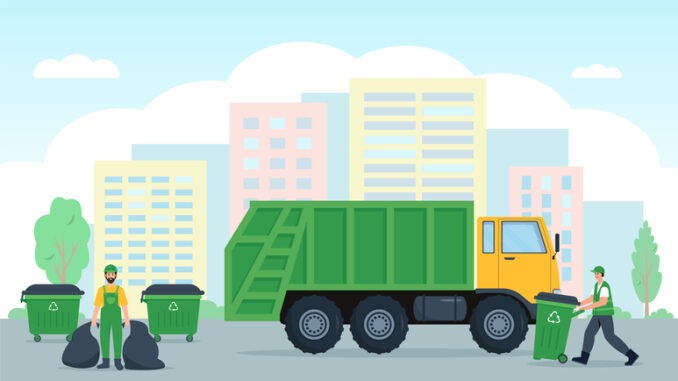
Nearing the end of our series which focuses on how to address each area of the Eco Schools Award, Helen Burge, deputy COO at The Priory Learning Trust, emphasises why taking the time to sort through your waste is beneficial for both your school and the world around you
Read the full article below or read on page 12 in our October magazine
How do you know you’re approaching the half-term holidays? By spotting the skip in the staff car park! Of course, there are loads of other indicators that a half term is nearing, but a big one has to be the start of the clearing out of cupboards of resources and paperwork. Long forgotten items, some needing repair, that had been stored safely at the back of the cupboard are brought out into daylight and judgements made on their future fate.
The skip fills up fast – there’s a bit of a rush to ensure their waste gets in the skip before it gets too full. Stuff is also hidden, so no-one can see them putting it in the skip – you know, when people realise that they’ve found something that should have gone home with a child a couple of years ago, or when they’ve found something they’ve assured their colleague wasn’t in their cupboard! They’ve been thrown, out of sight, out of mind. However, as Annie Leonard, executive director of Greenpeace USA says, “There is no such thing as ‘away’. When you throw something away, it must go somewhere.”
You may spot plastic polly-pockets and folders, still full of old learning schemes and phonics worksheets tipped into the skip; games with missing bits, broken plastic boxes, jammed laminators, cardboard boxes, computers with old operating systems no longer being maintained, defunct light bulb tubes, Coomber cassette players – you name it, it ends up in the skip rather than in the appropriate stream of waste management.
The school pays hundreds of pounds for the disposal of this mix of recyclable items to go into landfill – which took an afternoon to put in a skip and could be recycled for a fraction of the cost if managed properly. Plus, often, another skip may be required as the caretaker needed one for all the holiday jobs they have planned. Sound familiar to your school?
Sorting this material into waste management streams before it leaves the school site is the most effective way of ensuring the waste is recycled and landfill is reduced. Completing a waste stream audit might help focus your attention on your school’s priorities in relation to waste management, so collect the information about bin size, frequency of collection, cost, etc. for all your waste stream items in one spreadsheet and then use this to create your own waste management priorities.
| Waste Streams | Current position | |||||
| Bin size | Frequency of collection | Cost | Contract end date | Supplier | Notes | |
| Paper | ||||||
| Cardboard | ||||||
| Confidential waste | ||||||
| Food waste | ||||||
| Garden waste | ||||||
| Textiles | ||||||
| Wood | ||||||
| Glass | ||||||
| Metals | ||||||
| Plastics | ||||||
| Electrical and electronic equipment | ||||||
| Lighting tubes | ||||||
| Mixed recycling (cans, plastics, paper, cardboard) | ||||||
| Chemical/toxic waste | ||||||
| Nappy/sanitary waste | ||||||
| Do you have a locked bin store area? | ||||||
| Is it lit? | ||||||
| Is it big enough for your bins? | ||||||
| Do you have a waste compactor? | ||||||
| Do you have a cardboard baler? | ||||||
| How many hours a week do your site team spend on sorting waste? | ||||||
| How many skips do you hire a year? For what purpose? |
Give a reminder to staff that some documents should be disposed of via the confidential waste route and check your retention schedule too; you might be able to clear some space by shredding unneeded archive materials and some items may have a value to someone else.
Any items that have a plug, use batteries, need charging or have a picture of a crossed out wheelie bin on are known as Waste Electrical and Electronic Equipment (WEEE) and should not be disposed of in the bin or skip, but can be recycled at your local recycling centre, donated to charities (look at www.computers4charity.org) or you could contact the supplier for advice – many have recycle schemes and trade in opportunities. Printer cartridges and batteries can all be recycled easily using schemes like https://www.therecyclingfactory.com/business and https://www.bigbatteryhunt.co.uk/.
Some of these schemes can actually generate a small amount of additional funding for the school. In fact, many items can generate income, or make a difference for others in the UK and around the world, such as the https://crisppacketproject.com/ which turns crisp packets into survival items or can be recycled by https://www.terracycle.com/en-GB/about-terracycle/.
One of the schools in our trust has a ‘Preloved Prom’ and ‘Somewhere Special’ service. They collect donations of prom dresses, suits and accessories and house them in a beautiful room within the school, available for all to borrow for their special occasions. All our schools recycle preloved uniforms and, at the end of Term 6, some of our primary school children donate their school shoes to https://www.educatethekids.com/ for the pupils of Jolaurabi School in Kenya.
Many of these items would have been thrown away, if not in 2022 then in future years, but there was still some use and value in them. Let us manage our school resources the best we can – which includes after we have finished using them.


Be the first to comment